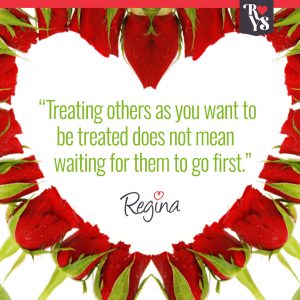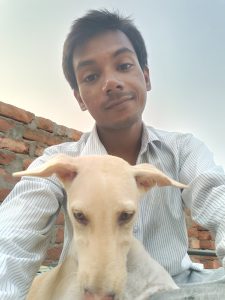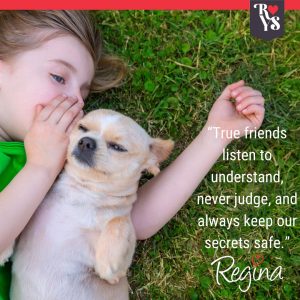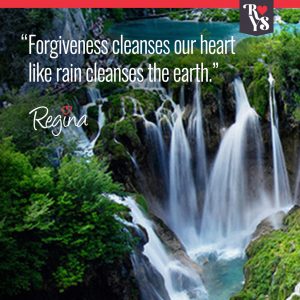
In the alcove of a storefront, close to the corner of Fairfax and Wilshire in Los Angeles, California, I sobbed in this homeless man’s arms. I did not know the man. Most likely I will not see him again. But I will not forget the moment our hearts touched in the intimate dance of raw truth: He lives on the street, and I, in a warm apartment.
Our exchange began when I commented on his dog. He smiled very proudly and said, “Yeah, she’s great. I’ve got her back and she’s got mine.”
As he spoke, he gently petted the dog. I reached into my wallet and took out all the money I had. Without counting or caring what he would do with it, I handed it to him.
He hesitantly took it. As our hands touched, my tears began. The man reached out, wrapped me in his arms and said, “It is okay. We’re okay out here. Thank you for caring.”
As I turned to leave, he said, “I love you.”
I looked him in the eyes and said, “I love you too.”
Until then I had never said “I love you,” to a complete stranger, someone I had just met and with whom I had exchanged only a few brief moments of conversation. However, when I spontaneously responded to the man with “I love you,” I meant it from the bottom of my heart and with every part of my being. There was no judgment. My soul was simply wide open, and the pure, honest emotion of caring deeply for the man came pouring out.
Love is who we are, when we allow ourselves to be it.
Each of us experiences countless transformational moments in life. Occasions when we are given the opportunity to advance the ability we have, as soul, to let unconditional love move through us without allowing fear, judgment, or expectation to stop us.
This was one of my moments, and I took it. I saw him and his dog and could have passed them by. But I heard a voice in my heart say, See him and tell him he is seen!
My choice to listen to and act upon my heart’s compassion opened me to a lesson I was only able to learn with the willingness to experience the sincerity of our exchange. Holding the man and allowing him to hold me birthed a deep and profound understanding of what it means to be vulnerable to caring, without expectations or conditions. The kind of affection we want to experience. The depth of intimacy we long for. The magnificent feeling of being connected to unconditional love in ourselves and in another human being.
Isn’t the goal of all religions to teach us to love one another like we love ourselves?
Whatever you wish that men would do to you, do so to them. ~ Christianity
What is hateful to you, do not to your fellow man. ~ Judaism
Not one of you is a believer until he loves for his brother what he loves for himself. ~ Islam
One should not behave towards others in a way which is disagreeable to oneself. ~ Hinduism
Hurt not others with that which pains yourself. ~ Buddhism
This is not a complete list, as I have only included the world’s top five religions. Yet the Golden Rule is the foundation for all other world religions too, and provides proof that God (whatever that energy is) was instrumental in the establishment of all religions.
In the exchange I had with the homeless man, I could have ignored the “heart-calling” I heard. In fact, if I had listened to and obeyed my fault-finding side, I would have kept on walking. The man was dirty and smelled bad. Maybe he would hurt or rob me. He should get a job. The dog might have had fleas. There were numerous fear-based excuses for why I should not stop.
Instead of giving in to judgmental excuses, though, I chose to follow my heart’s direction and act from nonjudgmental and unconditional acceptance. The soul I am did not care about the man’s tattered clothing, dirt, or body odor. Soul led me to hold him in my arms without scorn. Soul only cared about his kind spirit. In return, the soul he is accepted and returned my loving kindness.
I remember when I was young, my mother said, “We never know if someone we meet may be one of God’s angels.” My sweet, homeless man was an angel. He was God’s messenger of wisdom who taught me love is more than caring and affection for those closest to us. And so was my angel friend John who lived on the streets for 25 years.
He and I spoke often. When Covid-19 hit and the restaurants in our neighborhood that usually fed him closed, my neighbors and I made food for him. John was not mentally ill. He did not want to go to a shelter because he said they were not safe. Our local post office allowed him to stay inside overnight. Often he was there when Pat was working alone. She told me she felt safe knowing John was there with her.
John was on the streets because of some bad life decisions he made. We never really discussed it and it didn’t matter because to me and everyone who met John he was just a kind neighborhood friend. John’s only wish was to go back east to tell his nieces and nephews not to make the same mistakes he had made. He never got to make that trip.
John passed away in December of last year. The last day I saw him was when I gave him a new sweater and pair of socks for Christmas. He said, “Thank you so much for your kindness.”
I still miss him. We all miss John. He, like the homeless man I hugged, are people who made my life better for having known them.
I don’t have the one magic bullet solution to the crisis of homelessness. I also don’t suggest you hug every homeless person you meet. What I am asking us to do is to lead with compassion rather than judgment. Let’s see the unhoused as fellow human beings. Let’s say hello, make eye contact, buy them a meal, do something to be the positive change in someone’s life. Because in my experience our lives are changed for the better too when we are ambassadors of God’s love.




